Category: 200 Words
Stories that aim to convey a service experience in 200 words or less
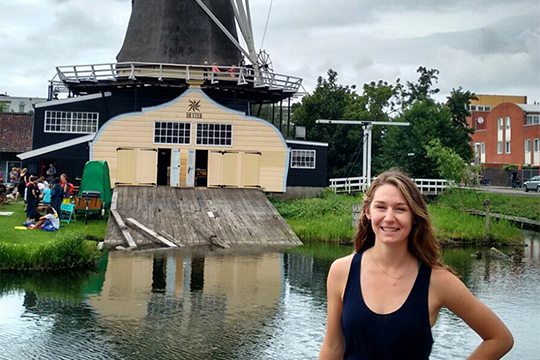
Greening cities
By Amy King, ’16 (Earth Systems); MS ’17 (Civil & Environmental Engineering: Atmosphere & Energy)
I make a quick stop at a café in Vondelpark before continuing my bike commute through Amsterdam en route to the office on the canal. Bike friendly and full of open spaces, Amsterdam is a model city for sustainability, and I contemplate its merits as I bike along the ancient streets.
Through a Schneider Fellowship, I worked six weeks in Washington, DC and six weeks in Amsterdam for the U.S. Green Building Council, producing the Global Real Estate Sustainability Benchmark Report, an annual account of how hundreds of international properties are striving for sustainable practices in their built environment.
Working with a multicultural team dedicated to urban sustainability, I edited and published the Innovative Case Studies section of the report, discovering along the way the wild ways companies are cultivating green practices in their business and buildings. One company had started a beekeeping program on their green roof, encouraging community and a buzzing bee population. Sharing these creative case studies showed me the green goals of big business, and gave me great hope! Discovering the impact possible in creating a greener built environment shifted my career trajectory from conservation to sustainable design, knowing I can best serve the natural environment by shaping the built one.
Schneider Fellows work at leading U.S. nongovernmental organizations (NGOs) to tackle today’s sustainable energy challenges.
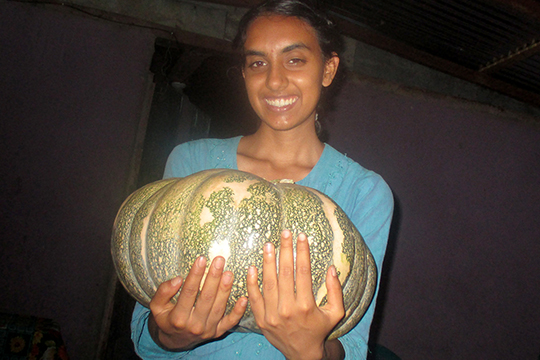
Caring for what we have
By Sneha Ayyagari, ’17 (Environmental Systems Engineering); MS ’19 (Civil and Environmental Engineering: Sustainable Design and Construction)
“Development is when people grow their conscience.” That is how a war veteran, skilled farmer, and environmental educator described to me what it means to create sustainable development. He explained that it doesn’t matter how much people do or don’t have; what matters is that they care for and care about what they have.
As a Schneider Sustainable Energy fellow in 2015, I worked with Asofenix, a grassroots organization that works to develop and improve the lives of rural Nicaraguans in the villages in the hilly state of Boaco. Throughout my fellowship, I supported projects that improved quality of life such as installing renewable energy, potable water infrastructure, irrigation systems, and clean cookstoves; creating an environmental education program; and supporting sustainable agriculture in the community where I worked and lived. I saw how the technical and educational parts of energy projects fit together into an integrated and transformational program. I was deeply moved by the opportunity to learn the stories of the resilient and loving people I worked with.
I also enjoyed learning the nuances of Nicaraguan culture, and the people I worked with became part of my family. I continue to call them every week. This fellowship reinforced my desire to couple my technical skills and interest in environmental engineering with my passion for teaching to create a more just and sustainable world.
Schneider Fellows work at leading U.S. nongovernmental organizations (NGOs) to tackle today’s sustainable energy challenges.
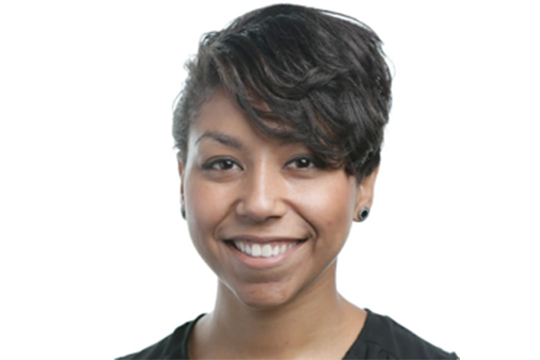
Returning to Guatemala
By Alicia Robinson, ’11 (International Relations)
I came to Stanford after spending most of my life living in Guatemala, where my mother worked for the United Nations. As an international relations major, my focus was on human rights and international law. As a sophomore, I obtained the Stanford Human Rights fellowship to work for UNICEF in Cairo. I was a member of the Stanford Rotaract Club, where I organized a service trip to Guatemala and also co-founded the Central American Students Association to raise awareness on campus about the socio-political realities of this region. I subsequently pursued my JD at Harvard Law School, where I continued to study human rights and post-conflict peace-building. I decided to return to Guatemala to contribute to efforts to curtail impunity, which has severely affected the country’s overall stability in recent years.
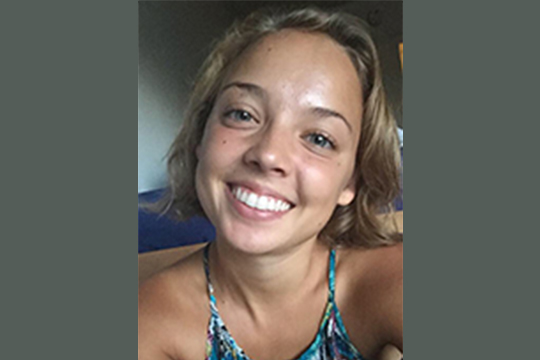
From Sequoia to Spain
By Celina Jackson, ’17 (Comparative Studies in Race and Ethnicity)
After fifth period comes to a close, I sit down with Mr. Rosario to debrief his English Support class — I volunteer there, at Sequoia High School, through the Haas Center’s High School Support Initiative. During the one hour and forty minute period I typically work with individual students, discussing their literary analyses of Richard Wright’s Black Boy and helping them pick apart the meanings of certain passages. I follow Mr. Rosario’s lead in encouraging students to find parallels between the life of the narrator – a black boy in the early 20th century south – and their own lives as mostly low-income Latinx students in the Bay Area in 2017. On the scenic drive back to Stanford along Alameda de las Pulgas, my carpool buddy and I chat about how difficult teaching is, our burning frustrations with the education system, and the inspiring moments when we connect with students or witness them realizing, “I get it.”
Over the past quarter, Mr. Rosario and his ninth graders have made my Tuesday afternoons joyful, challenging, and always energizing. The experience has been deeply rewarding for me on both a personal and a career level – I will be joining the teaching field next year on a Fulbright grant in Spain! – and I am extremely grateful for the opportunity to participate.
Celina is a student leader for the Haas Center’s High School Support Initiative, a program that allows students to work with underserved youth at local high schools.
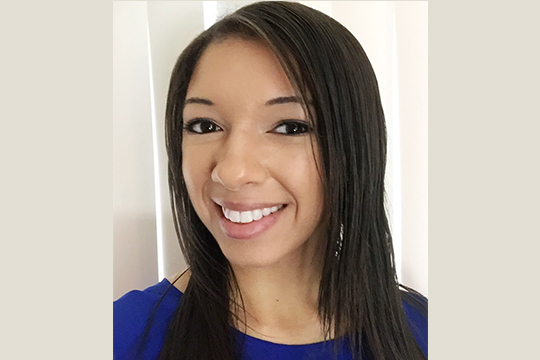
Finding the “why”
By Charlene Chambliss, ’17 (Psychology)
As soon as I mentioned that I was a Psychology major, Maria began excitedly peppering me with questions about the cultural psychology of South Korea, a culture she had come to be fascinated with through her love of K-pop and other Korean music. Time flew as I explained what I knew about how cultural norms develop differently in different societies, and I enthusiastically introduced her to many of my favorite methods for exploring a new subject online and by getting cheap used books through Amazon. When time came for me to go back to campus, I didn’t want to leave—helping empower Maria to feed her curiosity had easily been the most fulfilling thing I’d done all week.
I noticed that many of the students I worked with at Sequoia High School seemed to be “going through the motions” of their classes, following the path that they’ve been put on without a strong sense of purpose. At their age, I had often felt the same way—I had been taught to do well because it would pay off later. These students do want help with their homework, but what they really want is a reason to get excited about learning, a reason beyond “college and a good job” that speaks to their hopes and dreams for the future, and what kind of person they want to become. These youth are impressive—independent, resourceful, and willing to work hard. They’ve got a handle on the “how.” Now, all they need is their “why.”
Charlene is a student leader for the Haas Center’s High School Support Initiative, a program that allows students to work with underserved youth at local high schools.
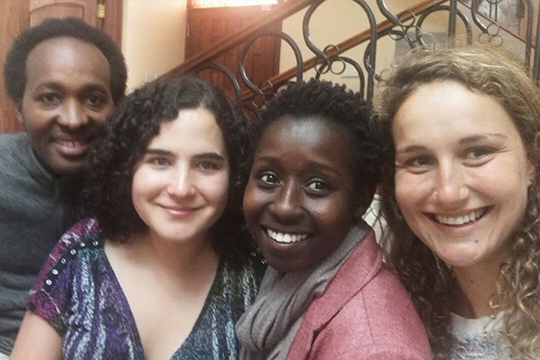
Research rooted in public service
by Ashley Jowell, ’17 (Human Biology) and Sharon Wulfovich, ’17 (Human Biology)
The sun was setting upon Arusha, Tanzania, as we joined together for an evening discussion. We, along with our translator, Jenipher, and project manager, Sianga, enjoyed our home cooked meal in celebration of completing our 16th interview. Our faces were glowing as we sipped our tea, finished our last bites of mchicha, and discussed the data we collected as well as its potential impact. The stories Maasai women shared had been informative, alarming, and inspiring as they described the impact that moving to Arusha from their village had on their lives. How, we discussed, might we use this research to benefit the women facing such hardships upon migrating? This was a conversation we would continue to grapple with throughout our entire project and on-campus conversations.
Our research, designed in collaboration with The Future Warriors Project, a Maasai-run NGO created by Sianga, involved interviewing female Maasai migrants who had moved to Arusha. While both researchers were looking at the impact of this journey on their health, Sharon’s project focused on health decision making behavior and Ashley’s focused on resilience and identity. As the four of us bounced ideas, we felt honored to conduct research that strove to benefit the community we were so privileged to serve.
Ashley is a member of the Public Service Scholars Program at the Haas Center, where she has continued engaging in discussions on scholarship & ethical service.
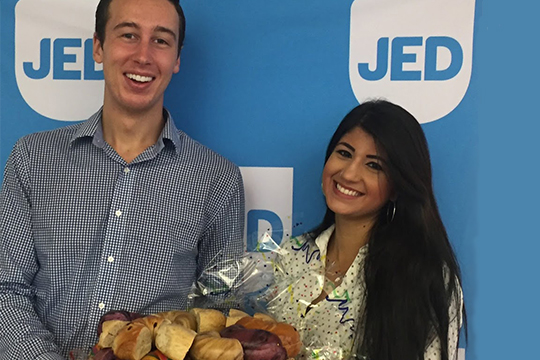
Community building amid high-stakes work
By Carter Osborne, ’17 (Political Science)
If you’ve never tried a New York bagel, you’re really missing out. I never could have foreseen my obsession with these rings of boiled bread, but there I was this summer, so enamored with them that I persuaded my coworkers to join me in a new lunchtime office tradition: bagel Tuesday. It was probably a bit goofy for an office setting, but such was the extent to which I felt at home with the phenomenal employees of the Jed Foundation (JED). I fit right in with the staff, and through 10 weeks of work with them, I got to observe and briefly experience both the fun and emotional challenge of their jobs.
JED is a Manhattan-based nonprofit that works to reduce rates of suicide and substance abuse among young adults. Through the Urban Summer Fellowship, I got to spend every day this summer immersed in powerful conversations concerning the emotionally weighty topic of suicide. And while my projects were sometimes emotionally difficult to complete, their potential impact on college students across the country always inspired the motivation required to keep pushing further. And of course, the endless positive energy in the office taught me how to balance my work with a fun lifestyle. My time with JED was challenging and hilarious and, at times, heart-wrenching, but I can honestly say that with everything considered, I wouldn’t trade my summer with JED for all the bagels in Manhattan.
Carter is a 2016-17 fellowships peer advisor.
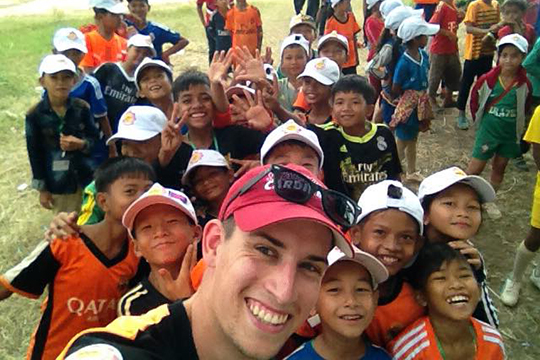
Using sport to engage youth
By Eric Fabre, ’16 (International Relations)
Applause broke out as Ed Foster-Simeon, CEO at the US Soccer Foundation, closed out the 2016 Soccer for Success National Training. It was the fourth and final day of the event, and the emotion from days of hard work was tangible in the room of this Washington, DC hotel. I had been at the Foundation for only 2 weeks, but in that short time had already witnessed the amount of time and effort that was put into this event. Over 150 people from around the country had flown into DC to learn how to run a local after school soccer program, designed by the US Soccer Foundation and their partner communities. I had been a small part of the implementation of the National Training, and felt humbled to be in the same room as so many people that have been true catalysts for change in their respective communities.
This moment stands out to me from my summer as a Donald Kennedy fellow because I realized that everyone in the room had chosen to use our program to create positive change in their communities. They believed that using sport was the best way to engage youth and affect their lives in a positive way. Seeing the emotion as they watched the final speech and the hugs and handshakes that went around as they said their goodbyes to their fellow coaches told me all I needed to know: this was the work I wanted to do, and I was proud to support these people in their community work.
Eric is a 2016-17 fellowships peer advisor.
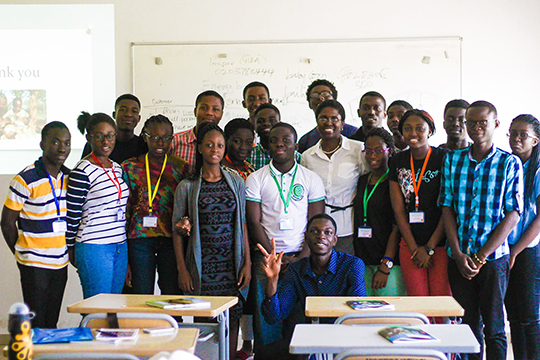
A summer of teaching and learning
By Brian Fleischer, ’19 (undeclared)
It was under the hot Accra sun that I realized why I was back home, why I was among this amazing group of students, and why I was doing this work in the first place.
When I received the Donald Kennedy Fellowship to work with high school students to propose and develop innovative solutions to problems they had discovered within their communities, I was still unsure if that was how I wanted to spend my summer. I was also unsure if I would be capable to lead the cohort of peer mentors and generally facilitate this project.
Not long after interacting with these students I realized that this was also a learning experience for me and a chance to immerse myself within and discover myself. I got to know and understand to some extent the various problems these students encountered and marveled at the novelty and practicality of the ideas presented. From “P-Coal,” a greener and cheaper alternative for charcoal made of waste, to “Senior Smile,” a youth movement for the neglected elderly, these ideas proved to the students themselves, their communities, and myself that the youth are indeed central drivers of positive change within their communities.
It was under that hot Accra sun that I realized that I was there to find myself.
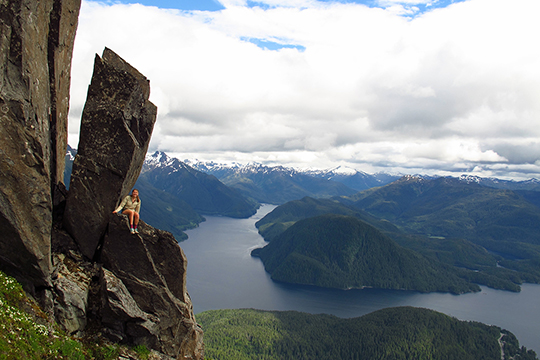
Real people affected by a warming world
By Sienna White, ’19 (undeclared)
I spent two months this summer living in Sitka, Alaska, working on a radio show about climate change. They were two long months full of rain, clouds, and watery sunlight, with a sky that never really went dark. Every day I’d walk three blocks down to the Island Institute and hole up, editing audio, calling people, reading. The work itself was fascinatingly behind-the-scenes. You read a lot about climate change up north. Part of it is science: Arctic regions are warming at nearly twice the rate of their equatorial counterparts. The effects of climate change are hauntingly dramatic. Houses fall into the sea. Glaciers disappear. Tides turn red.
But aside from the booming drama, what’s missing so often from these stories are the people who call these places home. Through the radio show, we hoped to explore all the nuanced connections people have with place, and the fragile grief inevitable with a warming world. I listened to hundreds of voices, through interviews and my headphones, and with every reflection, tangent, and fragmented thought, I felt as if I was honing in on something. I couldn’t quite tell what I was feeling—empathy? understanding? perspective?—but it felt important, it felt thoughtful and shapeless, and I was thankful to feel it, whatever it was.
